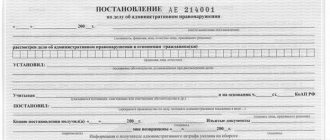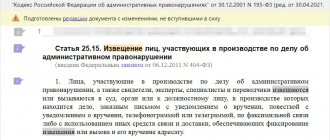1. A decision in a case of an administrative offense may be appealed by the persons specified in Articles 25.1 - 25.5.1 of this Code:
1) rendered by a judge - to a higher court;
2) issued by a collegial body - to the district court at the location of the collegial body;
3) issued by an official - to a higher body, a higher official or to the district court at the place of consideration of the case;
3.1) issued by the official specified in Part 2 of Article 23.79, Part 2 of Article 23.79.1 or Part 2 of Article 23.79.2 of this Code - to a higher body, a higher official, authorized by the relevant regulatory legal act of the President of the Russian Federation, the Government of the Russian Federation Federation or an agreement on the transfer of the exercise of part of the powers to the federal executive body or to the district court at the place of consideration of the case;
4) issued by another body created in accordance with the law of a constituent entity of the Russian Federation - to the district court at the place of consideration of the case.
1.1. A decision in a case of an administrative offense made by a judge may also be appealed to a higher court by an official authorized in accordance with Article 28.3 of this Code to draw up a protocol on an administrative offense.
2. If a complaint against a decision in a case of an administrative offense has been received by the court and a higher authority, a higher official, the complaint is considered by the court.
Based on the results of consideration of the complaint, a decision is made.
3. The resolution in a case of an administrative offense related to the implementation of entrepreneurial or other economic activities by a legal entity or a person carrying out entrepreneurial activities without forming a legal entity is appealed to the arbitration court in accordance with arbitration procedural legislation.
4. A ruling to refuse to initiate a case regarding an administrative offense is appealed in accordance with the rules established by this chapter.
- Article 29.1.7. Execution of a request to carry out administrative prosecution or to initiate a case of an administrative offense on the territory of the Russian Federation
- Article 30.2. The procedure for filing a complaint against a decision in a case of an administrative offense
What is an administrative offense?
This act is determined by the Code of Administrative Offenses of the Russian Federation - a codified legislative act. It prescribes the procedure for classifying the offense, responsibility, etc. According to the provisions of this law, this is an unlawful offense or inaction, for the commission of which one can be brought to administrative responsibility and the norms of the Code of Administrative Offenses of the Russian Federation can be applied.
Note! An offense committed in accordance with the Code of Administrative Offenses of the Russian Federation is not a crime, even if the punishment is imposed by a court. A person brought to justice is not considered to have been convicted. Data on punishment are not reflected in the system of the Ministry of Internal Affairs, and they will not be included in the certificate.
According to the Code of Administrative Offenses of the Russian Federation, 3 types of punishment are applied:
- fine;
- warning;
- administrative arrest. As a rule, 15 days are used, but if the offense is repeated, the arrest can reach 45 days.
Either the court or an authorized official can bring the guilty person to justice. For example, the driver violated traffic rules, which resulted in minor harm to the health of a third party. The degree of guilt and the applied punishment will be determined by the court. But, if the traffic violation is not associated with a potential deprivation of a special right, the decision will be made by the head of the traffic police department.
Reasons for appealing the protocol
The Code of Administrative Offenses of the Russian Federation does not contain an appeal against a protocol on an administrative offence, but it is possible to appeal against a decision on the application of punishment for committing such an act. The protocol and the resolution are different procedural documents. The law provides the following grounds for appealing an administrative offense:
- in the protocol, the representative of law enforcement indicated incorrect or untruthful information;
- the protocol was drawn up in violation of the law;
- The actions described in the protocol were forced in order to avoid more serious consequences. For example, a driver drove into oncoming traffic to avoid a collision with another car. That is, the traffic violation was committed forcedly. The decision can be challenged.
To prove your innocence and unlawful actions of the authorized body, you must present evidence. This may be testimony of witnesses, photographs, videos, and other information.
Participation of a lawyer in administrative proceedings
Today, there are a huge number of open resources where you can find out the procedure for appealing an administrative protocol. On the same resources, or at the representative office of the legislative body itself, you can download or view a sample of appealing an administrative protocol. But we recommend not using open access, since the information found does not reflect the individual characteristics of your situation and the circumstances of the case.
Do not break the laws and know your rights, then the weight of the problem will bypass you. If trouble strikes, you can always count on the help of our administrative lawyer. Sign up for a consultation today.
The procedure for drawing up and signing the protocol
The main reason for challenging the decision is an incorrectly drawn up protocol on bringing to justice. Therefore, it must be compiled correctly. According to Art. 28.2 of the Code of Administrative Offenses of the Russian Federation, the document must contain the following information:
- calendar date when the document was compiled and place;
- about the traffic police inspector or other authorized person - full name, position;
- about the person or organization against whom it was drawn up. If the opponent is an individual, then his full name, passport details, address where he lives and where he is registered (if they match, then only one needs to be indicated). If a protocol is drawn up against an enterprise, then its name, full name and position of the manager;
- about all persons related to the case (witnesses, victims);
- about the violation committed – place, date, exact time, circumstances, essence;
- reference to the violated normative act;
- written explanations of the person against whom the document was drawn up;
- others relevant to the case and making it possible to establish the truth.
Note! The violator must read the protocol and sign. The entry “agree” or “disagree” is also included, but a signature must be included. If the culprit does not want to sign, an additional act must be drawn up. It is signed by an authorized person and 2 witnesses.
While the protocol is being drawn up, the person in charge must provide explanations to the person. They can be oral, but you need to make a note that they were received. The document is drawn up in two copies - one for the violator, the second for the authorized person. If there is a victim, then he is also given one copy.
How to challenge fines online
Not every traffic fine can be appealed online. Drivers will have this opportunity only from September 1, 2021. Sanctions from photographic cameras can be challenged at State Services by receiving a free electronic signature.
Today, you can only file a complaint online against sanctions from MADI and AMPP. Only Moscow residents have this opportunity. You can challenge fines from MADI and AMPP through the following websites:
- mos.ru;
- avtokod.mos.ru;
- transport.mos.ru (legal entities send a complaint by e-mail on the organization’s letterhead with the signature of the manager).
Mos.ru accepts complaints regarding fines:
- for incorrect and unpaid parking;
- for a forced stop or parking in the wrong place, for example, if the driver became ill or the car broke down;
- for an erroneous decision (there was no violation or the license plate of another car is indicated in the document).
To challenge a fine, the driver fills out a complaint form, prints it out, signs it, takes a scan of the document and attaches it to the electronic application on the website. In addition, you need to attach documents for the car and a resolution on the sanctions imposed. The response to the application will be sent to your personal account on the website.
Avtocod.mos.ru accepts complaints for illegal parking, and also allows you to return funds erroneously paid for fines.
You can also appeal a decision on violation of traffic rules through State Services, but the list of cities and regions is limited. Residents of Tula, Moscow, Udmurtia, Tatarstan, Kaluga, Tver, Belgorod, Ryazan and Tyumen regions, Perm and Krasnodar regions can challenge the fine.
Drivers from other cities and regions can appeal the fine by directly contacting the traffic police. Not all traffic police have their own Internet resources that accept complaints online.
Some drivers write complaints on the official website of the traffic police. According to Article 30 of the Administrative Code, such appeals do not have legal force, since the driver does not have the opportunity to verify his identity with an electronic signature.
Also read: How not to “insist” on half a million and where to check your car for fines
What is the difference between a protocol and a resolution?
These are different procedural documents. The protocol is drawn up by an authorized person. For example, a traffic police officer. It records the circumstances of the incident and contains information about all persons related to the case.
The document is the main evidence in the case; the justice authorities rely on it to impose a fair punishment. A person has the right to give written comments and disagree with what is stated. Based on this, a decision is made. This is a serious document that can be appealed. It contains information about the punishment applied to the guilty person.
The protocol and resolution look like this:
You can appeal not the protocol on an administrative offense, but the decision adopted on it
Note! The authorized person who draws up the first document does not have the right to draw up the second. For example, in case of violation of traffic rules, a protocol is drawn up by a traffic police officer, and a resolution is drawn up by the court or the head of the department.
Who can challenge fines and how to find out if they exist
The right to appeal a traffic police fine belongs to the person in whose name the decision was issued, or his representative who has a power of attorney certified by a notary.
Fines from automatic traffic cameras are sent to the owners of the cars, and it is the owners who must appeal.
It happens that letters do not reach the recipient on time or are completely lost, and the car owner does not know about their presence. You can check your car for fines through the avtocod.ru service. The report is generated within 5 minutes and shows what problems, in addition to fines, the car has at the time of inspection.
In the block with fines you will see how many of them were issued, by whom, for what amount, for what items, what is the total debt.
If the violation is caught on camera, the report will display a photo that clearly shows the license plate number of the car. If the number belongs to another car, there is every reason to challenge the fine. A screenshot of this part of the avtocod.ru report can be attached to the complaint as evidence of innocence.
If the fines are old and the FSSP has imposed bans on the car due to non-payment, information about the restrictions will also be displayed in the report.
You can check your car for fines through the avtocod.ru service using the VIN or license plate number.
Also read: Payment of traffic fines with a 50% discount
Illegal actions when drawing up a protocol
Unfortunately, no one is immune from illegal actions of authorized bodies. These include:
- threats;
- pressure;
- the use of physical and psychological techniques;
- falsification of information.
It is recommended to record all suspected violations. You can use the technique to film video, create audio files or photos.
If the procedure or protocol rules are violated, it is easy to challenge it
When and where to file a complaint
How can you appeal a protocol on an administrative violation? If a person does not agree with the above, he can file a complaint. But you cannot challenge the protocol, you can only challenge the decision. There are several places to file a complaint:
- to the senior management of the authorized person who issued the protocol;
- the prosecutor's office or another supervisory authority;
- court.
If the decision is made by a court, then a challenge is possible on appeal through a higher judicial authority. It is not recommended to simultaneously file a complaint with the court and a higher authority. The judicial act will have priority.
Note! There are deadlines for appealing the protocol on an administrative offense and the resolution. The law sets aside 10 calendar days from the date when the perpetrator is given a copy of the decision. When calculating the statute of limitations, weekends, holidays and non-working days are taken into account.
Deadlines for appealing the decision
The procedure and deadlines for appealing in a case of an administrative offense are provided for in Chapter 30 of the Code of Administrative Offenses of the Russian Federation. A decision in a case of an administrative offense can be appealed within 10 days from the date of delivery or receipt of a copy of the decision (in some cases - within five days from the date of delivery or receipt of copies of the decisions, Article 30.3 of the Code of Administrative Offenses of the Russian Federation).
Missing the deadline for filing a complaint does not deprive a citizen of the right to appeal a decision to impose administrative liability. This period may be restored by a judge or official competent to consider the complaint. If you missed the deadline for filing an application, be sure to indicate valid reasons in your complaint and include a request to restore the deadline.
Valid reasons are:
- illness of the offender;
- the serious illness of his close relative, a child, due to which he had to take care of him;
- fires, earthquakes, floods and other natural disasters;
- force majeure events: robbery, attack, theft in an apartment, etc.
In all cases, the decision to restore the terms is made by a higher-ranking person - for example, the head of a department of the Ministry of Internal Affairs or a higher structure of the Ministry of Internal Affairs (or a court). The responsibility to prove the fact of a valid reason lies with the citizen - he must bring documents from the hospital, certificates from the police, etc.
In order not to be mistaken in calculating the period for filing a complaint, it is important to take into account that when the last day for filing a complaint falls on a weekend or holiday, the end of the period is postponed to the next working day.
Rules for writing and content of a complaint
Any appeal is drawn up in accordance with Art. 7 of Law No. 59-FZ. To be accepted for consideration, it must be:
- written;
- reliable;
- signed by the applicant. Anonymous complaints will not be considered;
- does not contain profanity, insults to third parties and other negative information;
- compiled according to the rules of business correspondence.
When compiling, the following information is indicated:
- about the applicant;
- about the authorized body that made the decision;
- protocol details;
- the circumstances of the incident;
- circumstances and evidence that prompted a person to appeal to challenge;
- attachment – a list of documents confirming the facts stated by the applicant;
- requirements for the authorized body - to cancel the punishment;
- date of compilation, personal signature of the applicant and its transcript.
Note! A positive (accept for consideration), neutral (leave without action) or negative (not accept for consideration) decision can be made on the complaint. Any of them is justified by legislative norms and sent to the applicant.
The complaint might look like this:
Sample complaint against a decision on an administrative offense
Commentary to Art. 30.1 Code of Administrative Offenses
1. The right to appeal a decision in a case of an administrative offense is an important procedural guarantee for the protection of constitutional rights and freedoms and for bringing to administrative responsibility.
A complaint against a decision in a case of an administrative offense can be filed at will by the person in respect of whom it was made, the victim, the legal representative of an individual, the legal representative of a legal entity, a defense attorney and a representative (see comments to Articles 25.1 - 25.5 of the Code of Administrative Offenses of the Russian Federation).
In addition, it is possible for the prosecutor to lodge a protest against a decision in a case of an administrative offense that has not entered into legal force (see commentary to Article 30.10 of the Code of Administrative Offenses of the Russian Federation).
A period of 10 days has been established for filing a complaint, which is calculated from the date of delivery or receipt of a copy of the decision in the case (see commentary to Article 30.3 of the Code of Administrative Offenses of the Russian Federation).
2. In accordance with Art. 245 of the Code of Civil Procedure, cases of appealing a decision in a case made by a district court judge or a magistrate refer to cases arising from public legal relations.
Based on the letter of the Supreme Court of the Russian Federation dated August 20, 2003 N 1536-7/obshch, explanations were given on the procedure for the entry into force of resolutions and/or decisions in cases of administrative offenses in the event of an appeal.
Thus, the filing and consideration of complaints are carried out in accordance with paragraph 3 of Article 30.9 in the manner established by Articles 30.2 - 30.8 of the Code of Administrative Offenses of the Russian Federation. The Code of Administrative Offenses of the Russian Federation does not provide for the possibility of appealing the decision of a judge of a regional or other corresponding court in the same manner; therefore, it comes into force immediately after it is made (clause 3 of Article 31.1 of the Code of Administrative Offenses of the Russian Federation).
If the case was considered by a non-judicial body (official), then its decision can be appealed to the district court (subparagraphs 2, 3 of paragraph 1 of Article 30.1 of the Code of Administrative Offenses of the Russian Federation), and the decision of the district court judge made on the complaint - to a higher court, i.e. . to the regional or other court corresponding to it (clauses 1 and 2 of Article 30.9 of the Code of Administrative Offenses of the Russian Federation).
If the case was considered by a magistrate or a district court judge, then its decision can be appealed in the manner established by Articles 30.2 - 30.8 of the Code of Administrative Offenses of the Russian Federation, only to a higher court, respectively to a district court or to a regional or other court corresponding to it (clause 1 of Article 30.1 of the Code of Administrative Offenses RF).
Article 30.9 of the Code of Administrative Offenses of the Russian Federation does not provide for the possibility of appealing the decision of a judge of a higher court in the same manner; therefore, it comes into force immediately after it is made (clause 3 of Article 31.1 of the Code of Administrative Offenses of the Russian Federation).
In the future, it is only possible to review decisions and decisions that have entered into legal force in cases of administrative offenses by persons specified in paragraph 3 of Article 30.11 of the Code of Administrative Offenses of the Russian Federation, based on protests from officials of the prosecutor's office listed in paragraph 2 of the same article, and complaints from persons specified in the articles 25.1 - 25.5, paragraph 1 of Article 30.1 of the Code of Administrative Offenses of the Russian Federation.
3. The decision in a case of an administrative offense can be appealed by military personnel (citizens undergoing military training) to the garrison military court (Article 29.5 of the Code of Administrative Offenses of the Russian Federation), and the decision made by the judge of the garrison military court can be appealed to the district (naval) military court.
The decision in the case of an administrative offense made by the district (city), city district commission for minors and the protection of their rights is appealed to the district court at the location of the relevant commission.
A decision on a case made by an official may be appealed simultaneously to a higher authority, to a higher official and to the district court at the place of consideration of the case; the complaint in this case is subject to consideration by the district court at the place of consideration of the case.
A complaint against a decision in a case of an administrative offense is not subject to state duty (see commentary to Part 5 of Article 30.2 of the Code of Administrative Offenses of the Russian Federation).
4. The jurisdiction of judges of arbitration courts in cases of administrative offenses is established in paragraph. 3 hours 3 tbsp. 23.1 of the Code of Administrative Offenses in relation to cases of challenging decisions of state bodies, other bodies, officials, on bringing to administrative responsibility persons engaged in business and other economic activities. These cases are considered by the arbitration court according to the general rules of claim proceedings provided for by the Arbitration Procedure Code, with the features established in § 2 of Chapter. 25 of the APC (see Part 1 of Article 207 of the APC). According to Part 2 of Art. 207 of the APC, proceedings in cases of challenging decisions of administrative bodies are initiated on the basis of applications from legal entities and individual entrepreneurs brought to administrative responsibility in connection with the implementation of entrepreneurial and other economic activities to challenge decisions of administrative bodies on bringing to administrative responsibility.
When deciding on the procedure for appealing a judicial act of a judge of an arbitration court in a case of bringing to administrative liability, it is necessary to be guided by Part 3 of Art. 30.1 of the Code of Administrative Offenses and the norms of arbitration procedural legislation, but not paragraph 1 of part 1 of Article 30.1 of the Code of Administrative Offenses of the Russian Federation.
The procedure for filing an application to challenge the decision of an administrative body to impose administrative liability is regulated by Article 208 of the Arbitration Procedural Code of the Russian Federation dated July 24, 2002 N 95-FZ (as amended on December 27, 2005, as amended on March 2, 2006) (Rossiyskaya Gazeta, 2002 July 27).
However, there is a conflict of law regarding the payment of state duty in this category of cases within the framework of the arbitration process, since there are contradictions between the norms of the Tax Code of the Russian Federation and the norms of the Arbitration Procedure Code of the Russian Federation. Yes, Art. 333.37 of the Tax Code of the Russian Federation does not contain provisions on exemption from payment of state duty for applicants when filing applications to challenge decisions and actions (inaction) of a bailiff, as well as applications to challenge decisions of administrative bodies on bringing to administrative liability. Meanwhile, part 2 of Art. 329 and part 4 of Art. 208 of the Arbitration Procedure Code of the Russian Federation, containing the relevant provisions that such statements are not paid with state duty, have not been cancelled.
Resolution of the Plenum of the Supreme Court of the Russian Federation dated January 20, 2003 N 2 (as amended on 06/02/2004) “On some issues related to the implementation of the Code of the Russian Federation on Administrative Offenses” (Bulletin of the Supreme Arbitration Court of the Russian Federation. 2003. N 3; Special Appendix to the Bulletin of the Supreme Arbitration Court of the Russian Federation, 2005. N 12) determines that when applying this norm, it is necessary to keep in mind that in the manner prescribed by it, decisions made by authorized bodies or officials, but not by courts of general jurisdiction in cases under their jurisdiction, are subject to appeal.
5. In the same order, the ruling on refusal to initiate a case on an administrative offense is appealed in accordance with the requirements of Part 4 of Art. 30.1 Code of Administrative Offences, i.e. depending on which body or official made such a determination.
6. Based on the results of consideration of the complaint against the decision in the case of an administrative offense, a decision is made (see commentary to Article 30.7 of the Code of Administrative Offenses of the Russian Federation).
The procedure for appealing a protocol on an administrative offense
There are several ways to file a complaint:
- by personally visiting the court, supervisory authority or supervisor of the authorized person;
- using Russian Post. To do this, you need to issue a postal item with a notification and an inventory of the contents;
- through the official website. Each organization has an official website that includes a form for submitting an appeal.
You must acknowledge receipt of the complaint. If it is delivered during office hours during a personal visit, then you need to make 2 identical copies. One is given to the secretary, the second remains with the applicant. It contains the number of the incoming document and the date of registration.
When sending using Russian Post, you must fill out a notification. When the envelope is delivered to the addressee, he will put his signature on the notification. When filing a complaint through the official website, a notification is sent to the specified email address.
The regulatory review period is 30 days.
At the protocol stage
This document is the main evidence of the commission of an offense. If it is drawn up incorrectly, then appealing the punishment will be quite simple. Therefore, some violators attempt to “confuse” or mislead the authorized person.
But this is rarely possible, since the protocol is drawn up by experienced people, and they are not so easily confused. While the authorized person is filling out the form, you need to remain calm.
Note! You should not offer a bribe. You will not be sent to prison for this, but in court such actions will work against the accused. Giving a bribe is a signal to the court that guilt has been indirectly admitted.
At the stage of out-of-court resolution
If a decision on this offense must be made by a governing body, then the appeal should begin with a higher organization. There is no point in filing a complaint with the prosecutor's office, since it will be forwarded to a higher authority.
The complaint is filed according to the rules prescribed in Art. 7 of Law No. 59-FZ. It might look like this:
At the stage of the court decision
The accused has the right to file a complaint immediately at the beginning of the trial in which his case will be heard. The most “popular” way is to call witnesses. As a rule, judges are very busy; a stream of similar cases passes through them every day. Therefore, the judge may make a mistake by refusing to call witnesses. This can be relied upon when appealing.
Appeal
An appeal must be filed with a higher court when the court's decision on the application of punishment enters into legal force. The culprit has 10 days to do this. The complaint might look like this:
If the 10-day period is missed and the adopted decision has entered into force, then you can appeal it through the supervisory authority.
How to file a complaint to appeal a traffic police fine
Currently, there are two ways to send a complaint to challenge a fine: send it by registered mail or bring it in person to the traffic police or the district court at the place where the decision was issued.
When applying in person, the complaint is submitted to the secretary in two copies. One will remain with the traffic police for subsequent consideration, and on the second the secretary will put a date and sign for receipt, and then return it to the driver. The car owner must keep this copy to confirm the filing of the complaint.
When sending by mail, you should save postal receipts.
Also read: How to appeal a traffic police fine from a surveillance camera: precise instructions
Possible results of the appeal
When challenging a decision to impose punishment for committing an administrative offense, there are several options. As a rule, the applicant asks to cancel the punishment completely and to declare him innocent. But the authorized bodies can make the following decisions:
- satisfy the complaint in full. That is, the applicant is declared innocent, all charges against him under the articles of the Code of Administrative Offenses of the Russian Federation are dropped, previously applicable sanctions are cancelled;
- partially satisfy the complaint. For example, the amount of the fine will be reduced, but the punishment itself will not be cancelled. It is possible that the hours of compulsory, forced or correctional labor will be reduced because a lesser degree of guilt will be proven than previously assumed;
- the complaint is dismissed in its entirety. That is, all the arguments presented in her “body” should be left without consideration or satisfaction. The punishment remains the same as in the resolution.
Note! The applicant has the right to challenge the decision on an already filed complaint. But you need to contact even higher authorities.
Features of appealing the protocol
The protocol is the primary document on the basis of which the entire case of an administrative act is built. It cannot be disputed! But the accused has the right to give his comments on the case and to disagree with what is stated in the document. All notes must be made in writing, certified with your signature, and the date they were made next to it. This is necessary in order to reduce the risks of falsification of information.
Protocols are often issued for violations committed in the field of trade. To appeal, you need to contact Rospotrebnadzor. This organization conducts scheduled and unscheduled inspections of any retail outlets that operate in Russia, as well as enterprises and entrepreneurs involved in the trade sector.
An inspection is carried out, the result of which may be a report on detected offenses. For example, the sale of low-quality and expired goods. Based on the act, a protocol on the offense committed is drawn up. The management of Rospotrebnadzor or the court will issue a decision on the application of penalties.
Regardless of who the violator is, he must be given a copy of the protocol. On its basis, he will build his line of defense; he will rely on the facts set out in the document.
Samples of a complaint about a protocol on an administrative offense
To correctly draw up a complaint, you need to have a clear example before your eyes. An incorrectly drawn up document is grounds for refusal to consider it. The deadline for submitting an application is limited, so you may miss valuable time. It is recommended to seek legal assistance. He will not only draw up a complaint correctly, but will also prepare the necessary documents and evidence to challenge the decision.
A sample complaint against a decision on an administrative violation through a higher court can be downloaded here:
A sample complaint to senior management can be downloaded here:
What to do if the complaint is not satisfied
If you receive a refusal to satisfy your complaint from the traffic police, you should contact the district court. In order not to be refused again, but this time from the court, we recommend that you support the complaint with more convincing evidence of innocence. If the district court refuses, contact a higher authority. The final authority is the Supreme Court of the Russian Federation.
If you cannot prove your innocence, you will have to pay a fine. You have 70 days to do this, otherwise the amount will double.
If you have a debt of more than 10 thousand rubles, bailiffs can seize bank accounts, suspend your driver’s license and apply other sanctions.
If you pay off the fine within 20 days of receiving the decision, a 50% discount will apply.
Also read: How to register a motorcycle with the traffic police in 2021






